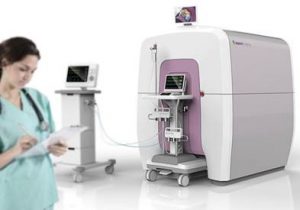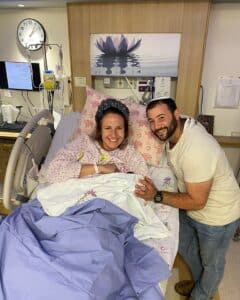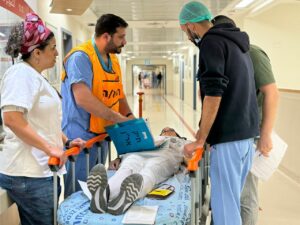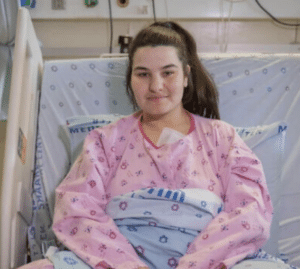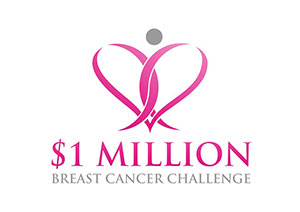The new Neonatal MRI that was implemented at the hospital. Shaare Zedek is the first hospital in the world to utilize MRI’s for infants and it was recently installed in the hospital’s neonatal intensive care unit to provide accurate neuro diagnostics. More information is below for your interest, or you can Click Here for more details.
The world’s first magnetic resonance instrument (MRI) built specially for examining premature and older infants has been installed and tested on six patients at Jerusalem’s Shaare Zedek Medical Center. The babies sleep comfortably while held in a soft brace during the scan and do not need to be anesthetized.
The device, called the Embrace system and recently approved by the Food and Drug Administration, was recently installed in the hospital’s neonatal intensive care unit. The Embrace device makes it possible to perform high-quality MRI tests without endangering the babies. This improves the service that babies and their families will receive – accurate information about brain structure, identification of infants at risk and early treatment of these infants.
The hospital, which serves as a beta site for the Aspect Imaging company in Shoham, did not have to pay the $1.2 million cost of the device because it has been testing it for the company with permission from the Health Ministry and the hospital’s Helsinki Committee for Human Medical Experimentation. In a month or so, the hospital is expected to receive ministry permission to use it routinely to scan babies.
The MRI is adapted to the physical size of premature infants and babies. It was specifically installed in the neonatal department so the tiny patients do not have to be moved from the unit to the hospital’s regular MRI institute, and the temperature can be kept warm as needed by the delicate infants.
The medical staff remain close to the premature baby during the examination itself, unlike a conventional MRI device, in which the technicians have to sit in a separate room. The reason, according to Dr. Alona Bin-Nun, a senior neonatologist at the Jerusalem hospital’s neonatal intensive care unit who heads the project, is that the magnetic field created by the new technology is from iron and confined to the device itself; in conventional MRIs, it is from a much-stronger electric current, so the room has to be kept cold.
Bin-Nun added: “Neonatal imaging has been carried out on a daily basis, but using ultrasound, which is not optimal for identifying problems. Until now, premature babies had to undergo four ultrasound screenings after delivery, at three days, a week and a month. Having a regular MRI scan could be dangerous for them.”
A baby girl scanned with the special MRI was suspected of having some hemorrhages in her brain, but they were found not to be dramatic, and she is in good condition. She is the surviving infant of a pair of twins born at 26 weeks almost two-and-a-half months ago.
With the special MRI, the baby’s brain can be scanned, as most of the risk in premature babies is in the central nervous system and the heart. We use it not only for premature babies at two kilos and even less, but also for full-term babies who went through a difficult delivery,” she explained.
In this way, a short, effective, and safe test can be performed, from the preparation of the newborn, through the MRI scan to the incubator, in less than an hour, compared to the previous system where the test lasted about two hours. The entire process is carried out in a safe environment, where the newborn is constantly monitored under conditions similar to the incubator environment.
Shaare Zedek delivers 22,000 infants a year in its main building and Bikur Cholim Hospital that it also manages – more than any other hospital in the world. Thus, said the hospital, it was therefore natural for the company to choose SZMC for the first installation.
Neonatologists from Boston’s Brigham and Women’s Hospital – affiliated with Harvard Medical School and considered one of America’s best medical centers – visited recently to see the Embrace. They use a conventional MRI and were very impressed by ours. They want to buy one from the company.


